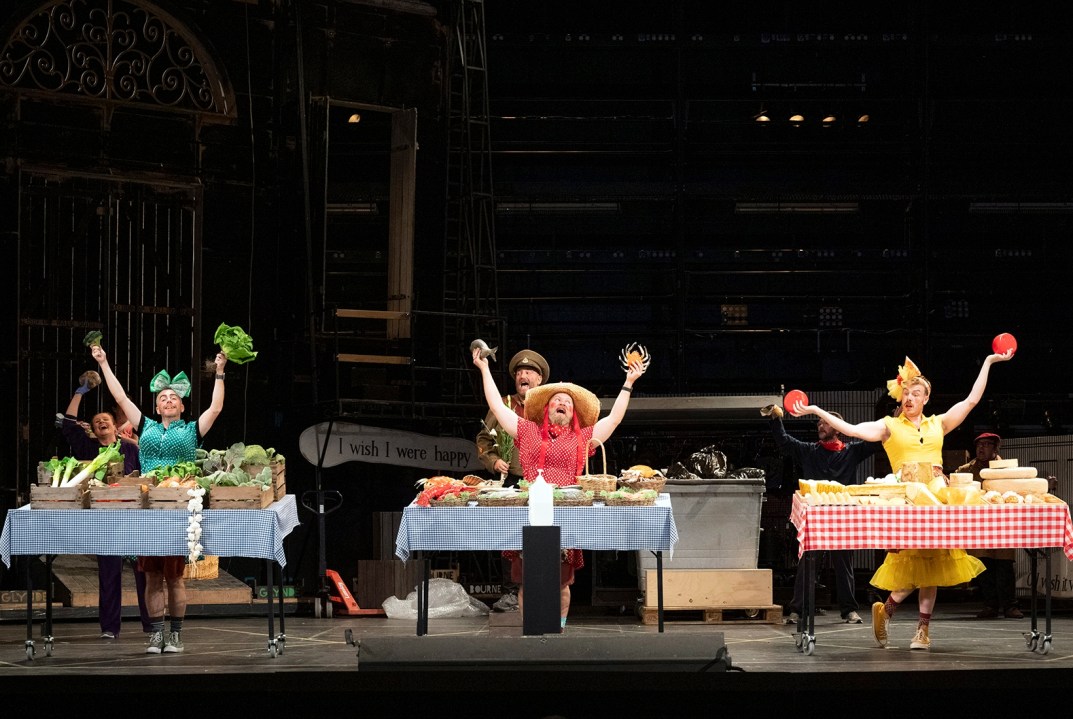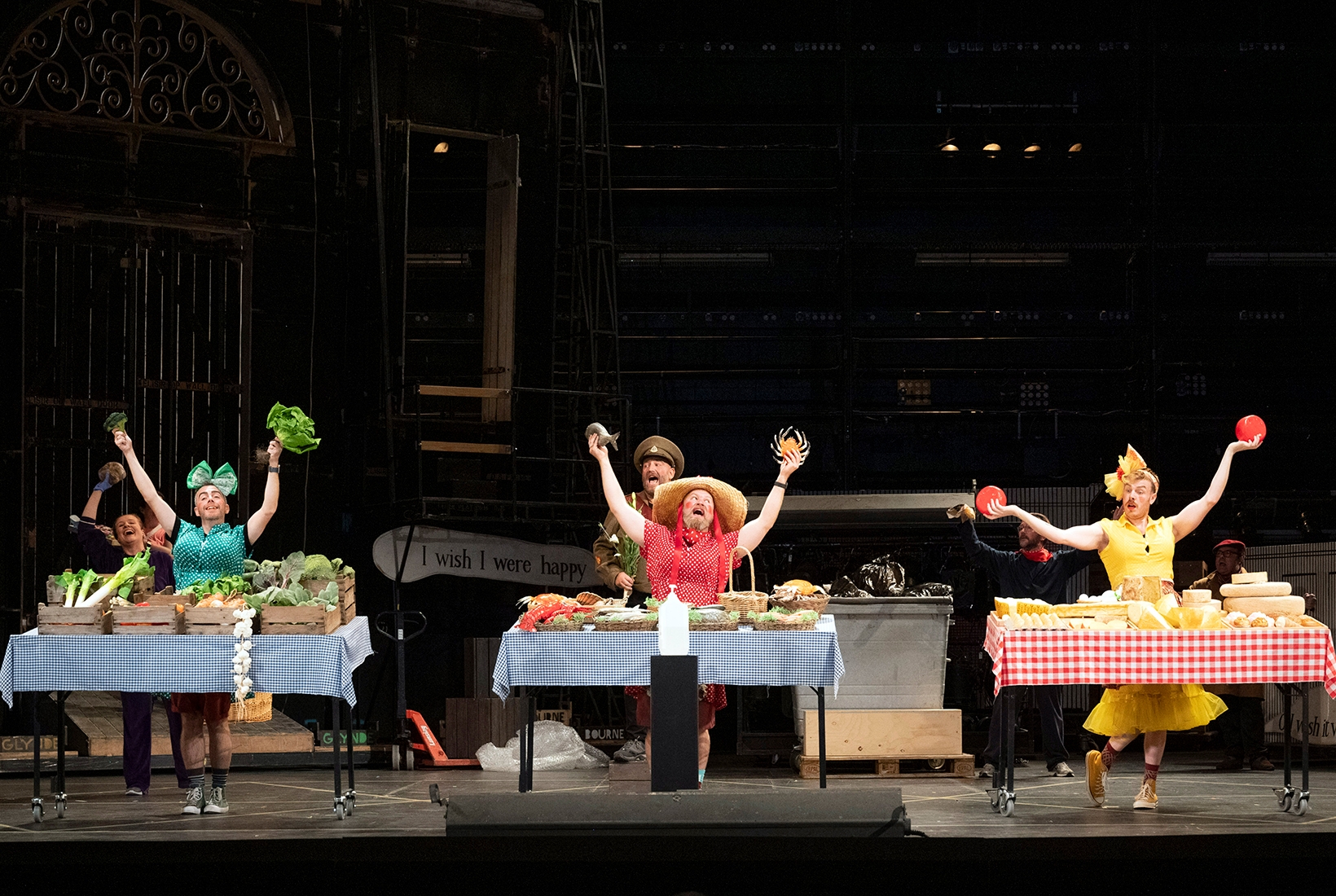Offenbach at Glyndebourne! Short of Die Soldaten with a picnic break or a period-instrument revival of Jerry Springer: The Opera, it’s hard to imagine a less probable operatic outcome— even this year. I mean, Offenbach: the saucy skewerer of middle-class pretension; the dazzling, vulgar arriviste of 19th-century opera. It couldn’t have been more incongruous had the sideburned showman himself razzed up, bass thumping, in a pimped Renault 5 and started pulling skids on the ha-ha. He’s never been staged at Glyndebourne, and it’s not hard to guess why. The last time I saw an Offenbach one-acter done in the UK, it was Croquefer, a medieval farce that climaxes with the entire cast succumbing to projectile diarrhoea. Try turning that into a range of luxury gifts.
Well, one can dream. It wasn’t easy to generate an atmosphere of irreverent laughter amid the cobwebbed gardens (visiting Glyndebourne out of season is like glimpsing a supermodel on a bad-hair day) and a general awareness that, at any moment, even this tentative step towards normality might be crushed by a randomly descending lockdown. The socially-distanced, picnic-deprived audience was subdued, and it’s a tribute to the company that they managed to make everything buzz along quite as sparkily as it did.
This was way more helpful than the tide of earnest new-music commissions about the trauma of lockdown
So in Stephen Langridge’s production, Offenbach’s Mesdames de la Halle becomes In the Market for Love. There’s an 18-piece orchestra in the pit and a small chorus that bustles enthusiastically to and fro, adopting heroic attitudes with root vegetables. And although it’s 2020 and there’s a big bottle of hand sanitiser centre-stage, we’re still in Offenbach’s Parisian market hall, where three working-class matrons — Mesdames Bouillabaisse (Brenden Gunnell), Beurrefondu (Rupert Charlesworth) and Mangetout (Michael Wallace) — preside over their stalls, court the superannuated Major Raflafla (Jeffrey Lloyd-Roberts) and try to work out which of them is actually the mother of the orphan Ciboulette (Nardus Williams).
Yep, Mesdames are actually Messieurs —each of them about as feminine as Les Dawson and camping it up a storm. No subtext here; no suggestion that this has anything more to do with transgender issues than the simple fact that hairy blokes in women’s frocks were funny in 1858 and they’re funny now. Get your fill of that while you still can. With the principal boy Harry Coe (yes, it’s that subtle) sweetly sung by Kate Lindsey, it was basically panto, and Langridge plays the contemporary jokes for wry smiles rather than satirical bite. Policemen prowled the stage, enforcing a three-metre rule with cattle prods and encasing Williams in bubble-wrap before letting her embrace her mother. Offenbach might have been nastier, though a socially-distanced catfight accompanied by honks, crashes and swanee whistles was a brilliantly silly addition.
Still, Williams and Lindsey are delightful lovebirds, Lloyd-Roberts makes Raflafla’s endless tongue twisters genuinely tuneful and Ben Glassberg conducts like it’s Figaro, as well he might. With boisterous direction, and the whole cast romping cheerfully over Offenbach’s bouncy galops and flirtatious waltz songs, it’s surely the most fun any of us will have in the opera house for the foreseeable future, and a million times more helpful, right now, than the incoming tide of earnest new-music commissions about the trauma of lockdown. I haven’t mentioned the set, because there isn’t one. The joke is that it’s all happening amid the backstage detritus of a happier Glyndebourne season, with bits of the famous Hockney Rake’s Progress set lying around the place. So that’s the gift shop sorted, where a pair of ‘Bedlam’ cufflinks can be yours for £79. Offenbach would have got an opéra bouffe out of that.
Like many orchestras, the Royal Liverpool Philharmonic Orchestra has rustled up a reduced live season. And having moved mountains to do so, it now finds itself continuing to improvise as shifting quarantine regulations mean that the conductor you booked last week is suddenly on the wrong side of this week’s travel ban. Andrew Manze was the unavoidable no-show here; but I was glad to have encountered his replacement, Rebecca Tong, and so too (judging from its reaction) was the orchestra. She gave an easy lilt to Sibelius’s Suite Mignonne, and it was oddly affecting to feel — really, physically feel — the throb of a bass pizzicato in that glorious art-deco auditorium.
Beethoven’s Grosse Fuge, played by the reduced string section, didn’t really come off; but then, it never does. And then Tong took Schubert’s Fifth Symphony and opened up grand, fir-clad vistas around the salted caramel tone of the RLPO’s superb principal oboe, Jonathan Small. The contact-tracing, the distancing, the ongoing arse-ache of masks and handwash: it’s worth it for a taste of the real thing — which can only happen with a real audience. God alone knows what the new restrictions in Liverpool will mean for all this, but we can’t go backwards from here. We simply can’t.







Comments